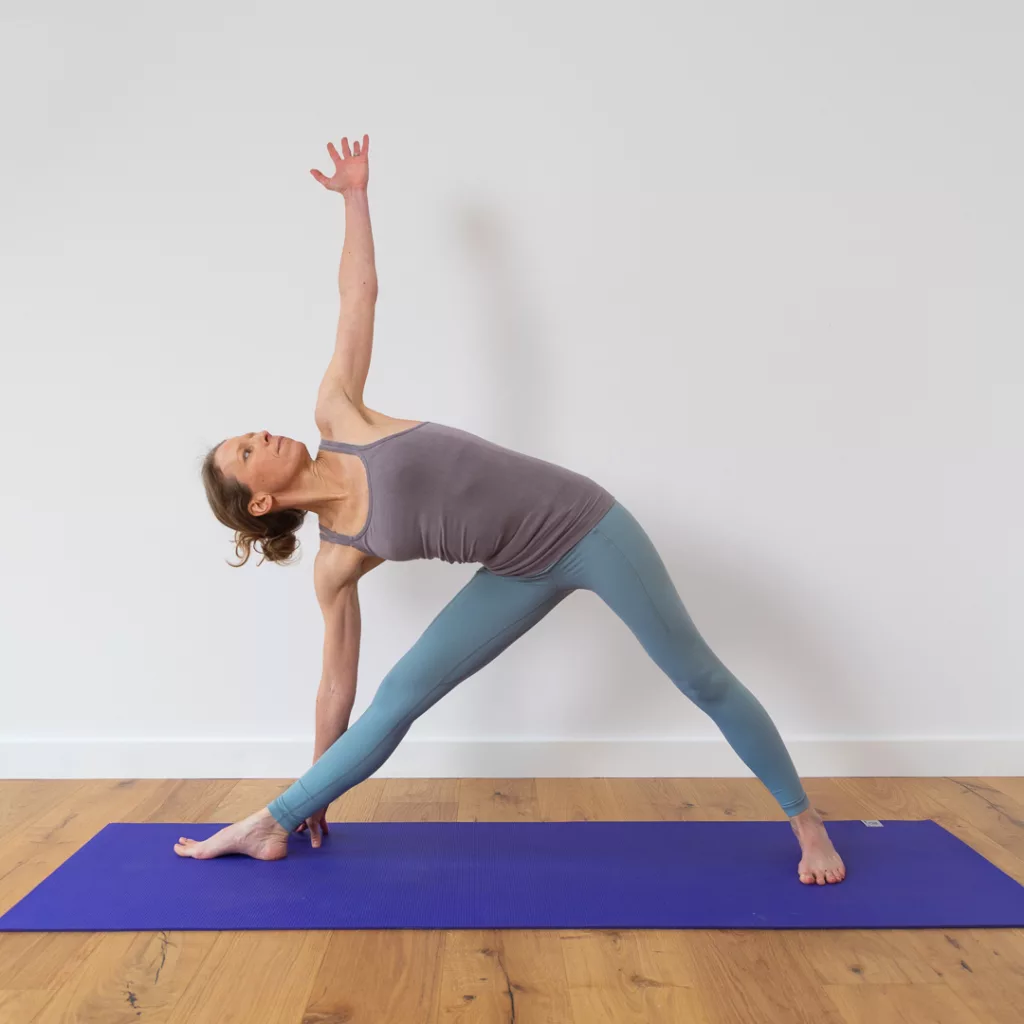
Yoga has been around for thousands of years, originating in ancient India. There are lots of definitions, most helpful to me is to do with the idea of union – of the body, mind and breath. We tend to think of it as making shapes on a mat, to improve our flexibility and build strength, and there’s nothing wrong with that. It didn’t start out like that though, and some would say the purpose of the asana (postures) is to prepare the body and mind for meditation. There are ancient texts which set out the yoga way, that include ethical principles to live by, breath-work and meditation as well as the asana. Adding in the breath-work and meditation can certainly make it an even more beneficial practice.
My practice
I came to yoga almost 30 years ago now. I had a dislocated hip as a baby, and am hypermobile, and am quite prone to joint pain. I’ve always loved sport, but found I had to stop running in my late teens due to lots of pain. I got into cycling which worked for my body but I still found I was in pain after a decent walk. A physio I saw at the time remarked on my flat feet, so I got some orthotics and the pain eased, but at the same time it didn’t feel right to me to just prop my feet up and I looked into other ways of supporting myself.
I tried out lots of yoga classes & teachers in Bristol until I found one I clicked with. The teacher quickly spotted I was quite bendy, and adjusted everything for me, not allowing me to cheat by using my bendiness to make the shape, instead teaching me about approaching the posture slowly from a position of power instead. Suddenly it was a challenge, and I was hooked. She constantly nudged me in class about my feet. A few years went by and I could see the newly developed muscles in my feet, and arches that had appeared, the orthotics went in the cupboard and the pain was gone.
As I’m sure is the case for many, I started a yoga practice looking for physical benefits and challenges, and found those, but have stuck with it for all this time because of the psychological benefits I’ve experienced. There’s lots of talk about flow states these days, and yoga for me is one of the best ways of experiencing flow. For me the magic comes when I’m balancing, and am aware of my breath. You can’t really think about anything else when you’re in headstand, you have to be mindful! I can still challenge myself and still have some 10 year goals I’ll probably never achieve, but take pleasure in continuing to practice.
I start most days on my mat, even if just for 5 mins. It’s a chance to just be, see what comes to mind and get ready for the day ahead. It can really help me tune in to what I need – some days I basically just have a lie down and do some breathing practices. Other days I’m doing handstands and jumping about. If you’re practising at home it can be tweaked to suit what you need on any given day. Practising in a class can give an amazing sense of connection though, and a community with like-minded others.
Menopause Yoga
During the menopause transition I think a yoga practice can really support us. It can help us tune in and connect to our changing body and have the space to recognise the different emotions we may be experiencing. It can help us maintain our muscle and bone strength, ease those aches and pains and support us to understand how to engage and relax our pelvic floor. The breathwork can be incredibly powerful for anxiety and stress, and there are practices which can support our sleep.
As part of my teacher training with the Bristol School of Yoga I researched the evidence for menopause yoga in supporting health and wellbeing in the postmenopausal years in four key areas – cardiovascular health, bone health, mental health and pelvic floor dysfunction. There are many studies out there, and some really interesting research, for example demonstrating a yoga practice in mid-life seemed to reduce inflammation (which is thought to be the root cause of much non-communicable disease, particularly cardiovascular disease). Another study showed yoga may impact brain-derived neurotrophic factor (BDNF), a protein involved in promoting neural growth and plasticity, which can potentially support the recovery from depression.
One of the most important benefits for me is to come to rest. At menopause we are pulled in so many different directions and many of us never stop. We all need rest.
I’d love to practice menopause yoga with you, you can find more details of my upcoming classes here.
